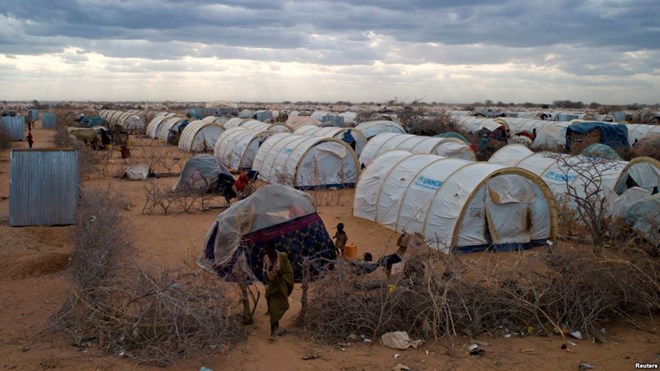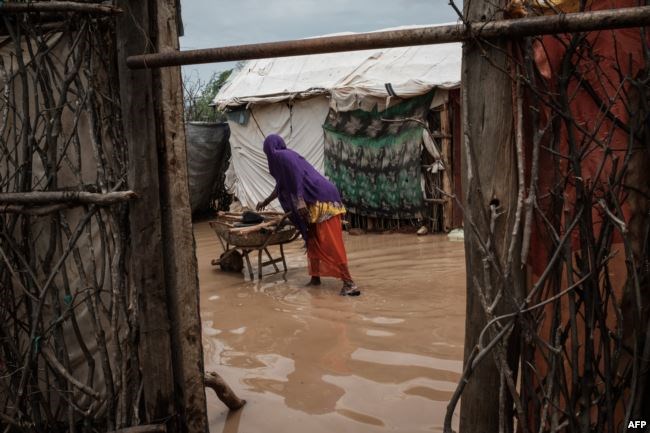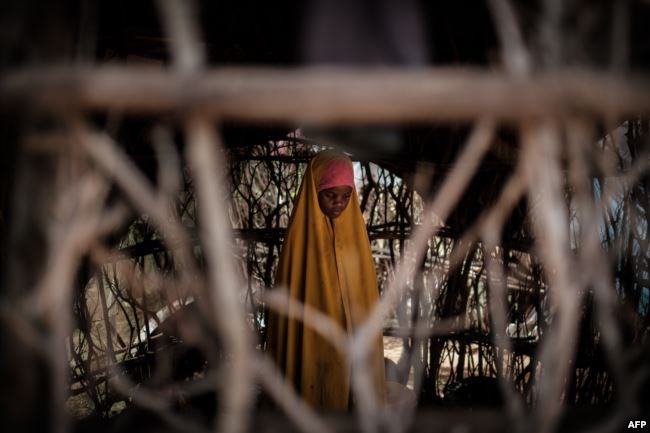
Saturday March 30, 2019
By Sarah Kimani
 FILE - A general view shows the tented settlement near the Ifo 2 refugee camp in Dadaab, near the Kenya-Somalia border, Aug. 29, 2011.
FILE - A general view shows the tented settlement near the Ifo 2 refugee camp in Dadaab, near the Kenya-Somalia border, Aug. 29, 2011.
NAIROBI — The future for a quarter million refugees in Kenya is uncertain as
authorities are threatening once again to close the 25-year-old Daadab
camp on the border with Somalia. Rights groups warn refugees face
violence and drought if they are forced to return to their home
countries.
Twenty-one-year-old Nyamouch James, a South Sudanese refugee living
in Daadab, at least, for now, is one of 250,000 refugees and asylum
seekers in the camp, the third-largest in the world.
But, according to leaked United Nations documents and Kenyan media,
authorities have revived threats to shut down the camp by August, citing
security concerns.Nyamouch said shutting down the camp would amount to punishing thousands of innocent refugees, like herself.
"It’s like they are grouping all people on this side of the camp as
bad guys," she said. "And they should consider this young generation
that is benefiting from free education, free food, free accommodation.
They will be messing [up] lives for thousands of people.”
Officials argue the camp, home mainly to Somali refugees, breeds insurgents who carry out terror attacks inside Kenya.
The January al-Shabab militant attack on a Nairobi hotel that killed
21 people spurred the latest effort to close Dadaab. Kenyan media report
some of the perpetrators were traced to the camp.
But rights groups say closing the camp would not solve Kenya’s security problems.
“We asked them whether there are any people who are facing
prosecution for terrorism or terror related charges and we can trace
them to Daadab. They did not have," said Otsieno Namwaya, an Africa
Researcher for Human Rights Watch, said
 FILE
- A woman cooks on a wheelbarrow beside flooded shelters after a heavy
rainy season downpour at the Dadaab refugee complex, in the north-east
of Kenya, on April 17, 2018.
FILE
- A woman cooks on a wheelbarrow beside flooded shelters after a heavy
rainy season downpour at the Dadaab refugee complex, in the north-east
of Kenya, on April 17, 2018.
"We also asked them whether there are any cases that are being
investigated of people who are related to Daadab," he continued. "They
did not have, up to now [they] have never produced any evidence apart
from this blanket condemnation. So we don’t believe this fear is backed
by evidence.”
Kenyan authorities declined requests for a comment on the leaked report and the future of the camp.
In a written response to the Kenyan government, The U.N. refugee
agency (UNHCR) said it continues to work with them for a lasting
solution. The agency said that includes voluntary repatriation,
resettlement into third countries, or relocation to the Kakuma refugee
camp on the border with South Sudan.
Forcing the refugees to return to violence and drought in their home
countries would be inhumane and would violate Kenya’s international
obligations, said Namwaya.
“Kenya has international treaties that it has signed, its own laws
that it has passed," he noted"Therefore it has its own international
obligations which it is also violating by what they are doing.”
 FILE
- A Somali refugee girl stands in a makeshift shelter at Dadaab refugee
complex, in the north-east of Kenya, on April 16, 2018.
FILE
- A Somali refugee girl stands in a makeshift shelter at Dadaab refugee
complex, in the north-east of Kenya, on April 16, 2018.
Not the first time
This is not the first time the East African nation has threatened to
close the Dadaab refugee camp. In 2016, Kenya’s interior security
ministry announced it would close the camp for reasons that included the
environment, economic burden, and national security.
A year later, Kenya’s high court stopped those plans, ruling that
closing the camp would be unconstitutional and a violation of
international obligations.
Kamanda Mucheke, with Kenya’s National Commission on Human Rights,
which filed the case, said the leaked documents show Kenyan authorities
are intent on pushing for the camp to close.
“We feel this is a way of circumventing the court order by exerting pressure on UNHCR,” he said.
A voluntary repatriation process from 2014 to 2018 helped over 80,000
Somalis in the camp return home. But refugee numbers have remained
steady since, according to Kamanda, due to rising violence inside
Somalia.